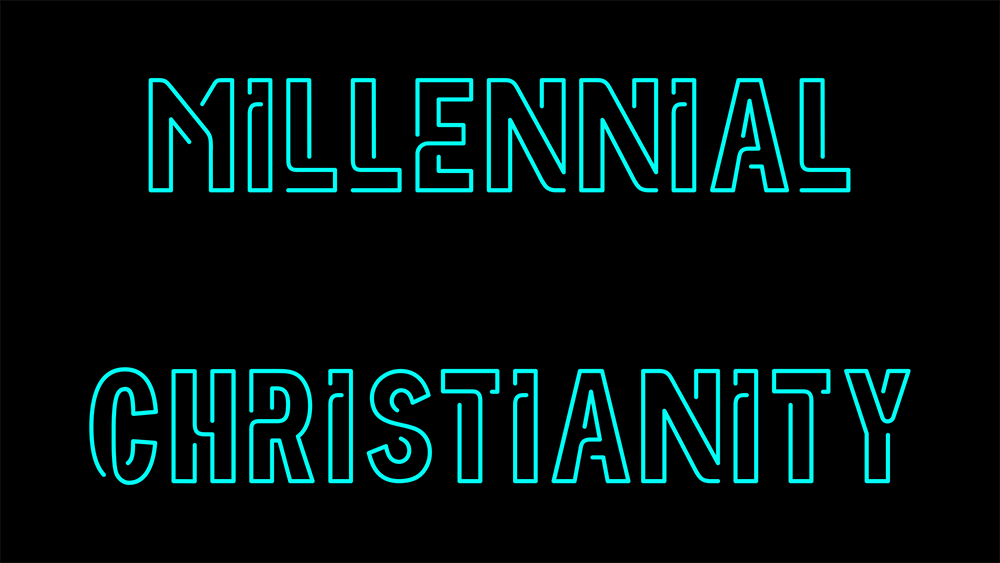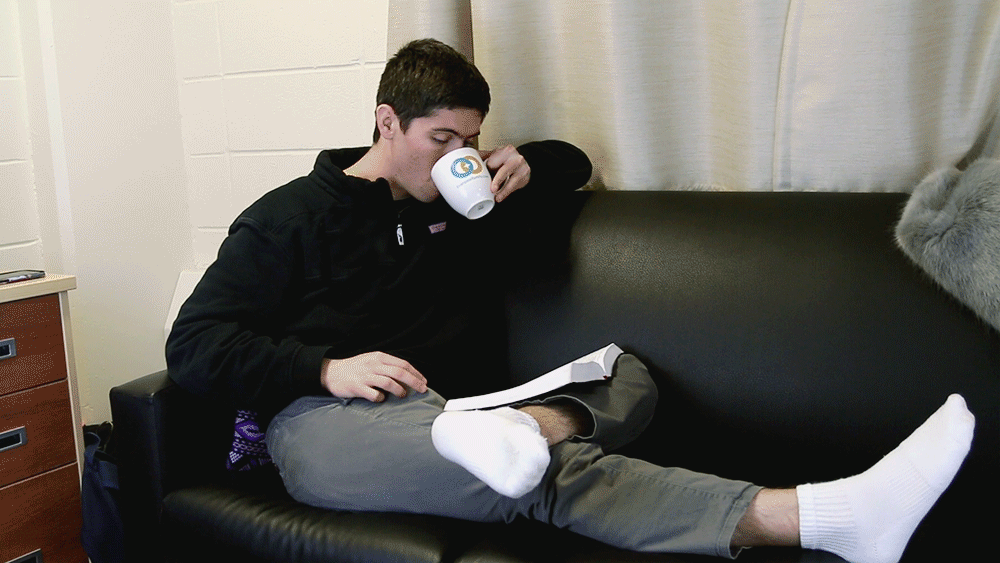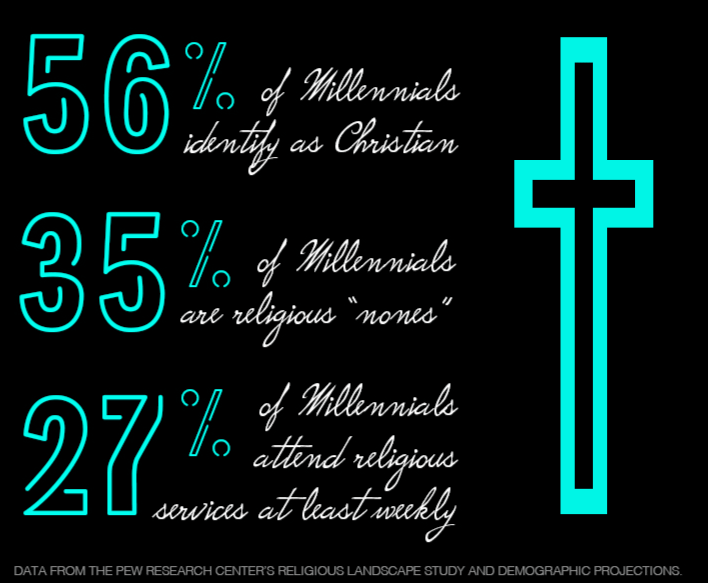
By Abby Rose Sugnet
Though church attendance declines among younger generations, a majority of young adults still identify as Christian and practice their faith in non-traditional ways.
A tall grandfather clock ticks away beneath the high-ceilinged office in Hendricks Chapel. The Rev. Brian Konkol, 38, sits in a leather lounge chair surrounded by a large couch, another chair, coffee table, stacks of paper and boxes of framed art that rest on the floor. Konkol, known for his plaid button-down dress shirts, bow ties, large round-framed glasses, jazzy socks and perfectly combed short brown hair, says the messy state of the room makes it feel like walking into open-heart surgery. But he has an excuse. He just moved into the office after being installed as the new dean of Hendricks Chapel at Syracuse University, a job that requires him to tend to the spiritual lives of 21,970 college students, most of whom are millennials.
“I think that the majority of our students are yearning to explore religious and spiritual life,” says Konkol. In fact, according to the Hendricks Study Final Report, 83.4 percent of Syracuse University students consider themselves spiritual beings. That number stands in contrast to research regarding church attendance. According to a study by the Pew Research Center, only 27 percent of millennials attend religious services weekly. But when contemplating the spiritual lives of millennials, Konkol thinks there are better ways to evaluate faith. To illustrate that point, he uses the metaphor of digital photography, a tool familiar to many in this generation. “Just because millennials don’t buy a lot of film doesn’t mean they don’t take a lot of pictures,” he says. “So sometimes people might be looking in the wrong place.”
Just as this generation has changed its attitude about other critical life experiences compared to previous generations — delaying or rejecting home ownership, car ownership and marriage — it also approaches religion and, in particular, Christianity in ways that stand out. And just like other generations, their tastes and beliefs influence how all Christians worship.
According to the Pew Research Center’s Religious Landscape Study, 56 percent of younger millennials identify as Christian, and 58 percent of those millennial Christians say religion is very important in their lives. In the coming years, those numbers are likely to grow: The percentage of Christians in the world population is expected to increase by one percent between now and 2060, according to that same Pew study.
Ph.D. and M.Div James Emery White, professor of theology and culture at Gordon-Conwell Theological Seminary and author of The Rise of the Nones, says young people hunger for “the three C’s” — cause, community and Christ. White says that millennials hunger to feel like they can contribute to something meaningful. That concept of cause comes first, followed by the desire for a community that supports those same goals.

Like other aspects of millennial lives, technology and the value placed on the individual fuel and inform this generation’s spiritual lives.
“It is more likely that individualized forms of faith activity will grow — especially through various forms of media and technology — rather than a return to corporate religious activity in local church settings,” says George Barna, founder and former president of Barna Group, a research organization based in Ventura, California, that focuses on the intersection of faith and culture. Barna’s book, America at the Crossroads: Explosive Trends Shaping America’s Future and What You Can Do About It, states that about four out of 10 adults read the Bible at least once a week outside of church services. His data shows that faithfulness to Christianity endures among millennials, despite a rejection of the institutional church.
In fact, the physical church serves as an easy way to categorize millennial Christians who typically fall into one of two camps — those who love megachurches and those who do not. Typically, megachurches attract evangelical protestants and bring in at least 2,000 faithful every week, according to the Hartford Institute of Religion Research. Other hallmarks include charismatic ministers, suburban locations to accommodate the large size of their congregations, many social and aid ministries, and internet-based outreach focused on community-building.
Though the concept of the megachurch originated in the 1800s, very few megachurches existed until the 1980s and 1990s. This next generation of the church began to draw in millennials because it employs visuals to stimulate members’ spirituality. That use of technology also helped expand the church’s reach.
“What you’ve got is the megachurch as sort of home base, and there you’ll have a pastor who’ll be speaking to people in different churches,” says Gustav Niebuhr, director of the Carnegie Religion and Media Program at Syracuse University. He says the megachurch networks resemble corporate America because “you’ve got these headquarters which is where the top people are, and then you’ve got spinoffs that answer to headquarters.” The churches all represent a single-purpose mission, working off of the church’s “headquarters.” Contemporary communications allow these churches to communicate and deliver the same message to multiple churches.
Beyond the technology, the sermons also play a role in attracting this generation. Bucknell University professor and author of Progressive Evangelicals and the Pursuit of Social Justice, Brantley Gasaway says that pastors are not only preaching sermons, but are also offering visual experiences with PowerPoint.
“The adaptations or styles that reflect the culture are more accessible to people who are less familiar with traditional modes of church and with the Bible,” says Gasaway.
Megachurches such as Hillsong, Vineyard and Willow Creek all rely upon this type of worship. Of those, Hillsong Church is the largest. It started in Sydney, Australia in 1983 and now exists in 19 countries with a weekly attendance of nearly 100,000 globally.
Known for its music, Hillsong’s three bands play their worship music on international tours, and an estimated 50 million people sing their songs in sixty languages each week. Hillsong’s services offer the excitement of a large concert with the intentionality of evangelical service.
“Hillsong has a particular flavor to it, like a big stadium concert, shorter sermon, lots of lights and effects and great graphics and bigger crowds,” says Barna Group Editor-in-Chief Roxanne Stone. “That attracts a very particular flavor of millennial.”
Those special effects extend the intensity of those services and those who work to guide the faithful who attend them. At a Hillsong premiere event in Boston this past summer titled “Welcome to Church Night,” the line to enter wrapped around the large, block-sized building in Cambridge, Mass. The international megachurch’s volunteers swarmed the hundreds of twenty-somethings in line.
One greeter, who introduced herself as “Jill,” wore a black sleeveless shirt, black jeans, black boots, a black-and-white-checkered flannel wrapped around her hips and a big smile. She grabbed a hand, looked directly into each person’s eyes and expressed her enthusiasm that that person had shown up to worship. Upon entry, the attendees received neon-green wristband as admission tickets before scrambling to find an open spot to stand in the dark and noisy basement that, on most nights, served as a nightclub.
More than 100 people filled the space, and only a few seemed to be older than 35. Eventually, a man stepped onstage wearing a plaid shirt buttoned all the way up, with jeans, a scruffy beard and a Macklemore haircut, probably in his late twenties. For the next 30 minutes, he explained that Hillsong Boston would begin Sunday morning worship services in the fall, when they have a venue — until then, “connect groups” were encouraged.
“Church should be enjoyed, not endured,” he said, which is why Hillsong seeks to provide an entertaining experience at church events.
Dean Konkol describes this charismatic, evangelical, nondenominational megachurch segment of millennial Christians as one that directly reflects popular culture. “They’re saying, ‘Gosh, I like this kind of music, and that music I am hearing on Sunday morning is kind of like the music I already like, so I’m going to go there,’” he says. “It’s a familiar cultural milieu.”
However, not all millennial Christians appreciate this experience. In fact, many reject it in search of something that offers them more authenticity. Pastor Chris Hall, 30, of Reunion Christian Church in Boston, who wears dark-blue jeans and a dress shirt to preach at church on Sundays, understands that rejection. He says this group of millennials are tired of church feeling fake or over-produced. They want church to feel real and genuine.
Hall sees a push for simple Sunday morning gatherings that focus on authenticity and avoid what he describes as consumerism. That sentiment resonates with Syracuse University alumna and lifelong Christian Abby Case, 22, who feels disappointed in Christian culture “when I feel like I’m surrounded by people in flannels, in a place that feels like people are there because it’s cool, and not because they’re trying to seek Jesus and his presence and whatever comes with that.”

For many millennials, that search for authenticity means avoiding church all together. In fact, as church attendance declines, the number of people who identify as “nones” is on the rise — that is, people who reject any specific religion. According to Dr. White, the “nones” are the fastest-growing and now third-largest religious constituency in the United States. However, this doesn’t mean that they reject the idea of God. In fact, two-thirds of “nones” believe in God. Millennials in general tend to think more grayly than previous generations.
“You don’t just see this in spirituality. Many millennials claim an independent or moderate view of politics. They don’t want to fully subscribe to one party or the other,” says Stone.
According to Stone, even millennials who do label themselves as Christians are less likely to attend church or to attend it on as regular a basis as older generations. This is due to the many other ways for millennials to experience what people used to experience in church. Harvard Divinity School Professor David Holland says that “you used to go to church because that was your source of connection, that was your source of information.” But Holland points out that many alternative places exist to acquire those things in 2017. “I think for people who are digital natives and are used to the creation of these virtual communities, the prospect of needing to go to a brick-and-mortar building with the same group of people every week seems less appealing, less needed,” says Holland.
Listening to sermons on podcasts and worship music on the Internet means millennial Christians can practice their faith without going to a traditional church at an inconvenient time. Rather, they can listen to their sermon whenever it works best for them with their smartphones. Fewer millennials go to church than any previous generation, and older generations blame them for the “decline” in faith. Konkol thinks the majority of SU students are yearning to explore religious and spiritual life, but “the problem is that the generation before them has gotten so accustomed to privatizing it and not speaking about it.”
"For people who are digital natives and are used to the creation of these virtual communities, the prospect of needing to go to a brick-and-mortar building with the same group of people every week seems less appealing, less needed."
When Syracuse University alum Johnny Rosa went to a college party, he did not wait for someone to ask him why he wasn’t drinking. “I rarely had big, lengthy conversations about religion with folks,” says Rosa. “It was mostly little moments. You sort of pile up the little moments, and you end up having influential conversations with people.” Known as “the Christian guy” among his friends, Rosa attracted jokes when he started having a few extra beers. “I thought you were a Christian!” He says his friends were actually helping him by doing that, because it may be a joke for them, but it’s real for him. “Oh yeah, thanks for calling me out, I’m going to shape up,” he said to his friends. “I got the moniker of the Christian kid so they sort of held me up to my standard, whether they meant to or not.”
But that willingness to drink on occasion also highlights another trait of millennials — that quest for authenticity also informs their appreciation of food, drink and their relationship with the secular world. Christian Brett McCracken, a journalist for publications including The Wall Street Journal, Huffington Post, and CNN.com and the author of Hipster Christianity: When Church & Cool Collide, believes millennials possess a more worshipful view of “secular” culture and see God’s goodness and beauty through good food, drinks, music and films.
“I think the interest in coffee, specifically good coffee – third-wave coffee and pour-over – have to do with that, embracing this beautiful thing that God has created: the coffee bean,” says McCracken.
Joshua Best, pastor and author of Y – Millennial Christian Manifesto, says that, “having been born into an age that is highly developed, millennials aren’t as fixated on the future as previous generations. Instead, there’s a nostalgic longing for the authentic lifestyles of a previous time.” Thus, millennials reinvigorate discussions on locally sourced goods, handmade products and environmental responsibility. “There’s been a resurgence of farmers’ markets, craft breweries and local coffee roasters in developed nations across the world,” Best says. “The rise of the Millennial generation has given society a mandate to be authentic and to bring back good things that have been lost.”
Millennials distinguish themselves from previous generations of Christians in that they want to dedicate all week to their faith, rather than just at church on Sunday. They are open to experimenting with the physical location of church and seek authenticity in common gathering spaces. Best says that millennials also use coffee, wine and beer to spread the Gospel. “I think that is a way that we connect with non-believers, and to show them that we’re not weirdos,” Best says.

Roxanne Stone adds to this idea by pointing out that millennials value hospitality as a way to express their generosity. They use beer and wine to create a welcoming environment “that puts everyone at ease and encourages conversation and dialogue,” she says. This concept of creating a welcoming environment also creates an incredibly empathetic generation that’s willing to speak out against social issues and encourage the church to be part of social justice. Deacon Nathan Gunn of Holy Cross Church in DeWitt, New York, thinks another part of worship – service missions – gives millennial Christians “tremendous opportunities to see the hands and the feet of God in the world, and that’s been such a great change.” With technology, the world shrinks, and young people hunger for a real global experience. “And it’s really great that the church is at the forefront of that experience,” Gunn says.
Stone says that “a lot of these millennial Christians are really trying to place these social justice desires within the biblical context and to remind the church that this isn’t just a political liberal issue, this is a Gospel issue.”
The thinking that millennials bring to church also contributes to their willingness to adopt other faith traditions into Christianity. According to Stone, millennials have the ability to see beyond an us-them or a black-and-white kind of faith. Thus, millennials adopt practices associated with non-Christian faiths, suggesting that millennials do not fear changing faith life and adopting new practices. Pastor Chris Hall says that meditation and yoga are ways for millennials to not just make sure they know where they’re going when they die, but to live better now.
“Growing up, my family or even my parents or their parents would’ve been like, ‘Yoga is of the Devil. That’s not Christianity, that’s witchcraft,’ or whatever,” Hall says. “And we’re kind of going like, ‘if it has things that draw us closer to God or center us personally in our spirituality, it can be reclaimed and renewed.’”
Hall says, though millennials are walking away from some aspects of the church, they are not abandoning their faith. “It’s just a matter of doing it differently,” he explains.

Vineyard Church’s Westcott location — one of four in the Syracuse, N.Y., area — continues to draw in millennials. Total number of attendees has risen from 35 to 40 people in August 2013 to 65 to 70 people currently. “Our student numbers have decreased overall a bunch since we moved from Funk ‘n’ Waffles to our location in the Westcott area, but our millennial numbers overall haven’t decreased too much,” says site pastor Chris Honness in an email. “The amount of students attending Sunday services and Bible studies is now increasing after our stabilization in the Westcott neighborhood.”
On a Sunday morning at Vineyard Westcott, volunteers greet attendees with large smiles and excited attitudes. Recess, the local artisan coffee shop, provides free coffee, along with the fruit and snacks available to church visitors. 80 or so chairs sit before a colorfully lit stage with acoustic guitars and drums. After worship, Honness gives a sermon about the importance of spending time with Jesus and sharing that with a community. At the end of the service, dozens of millennials mingle in their T-shirts and flannels with coffee in hand before heading upstairs from the basement and outside. Some churchgoers walk down South Beech Street to their cars. Others head to Westcott Street and over to Recess for another cup of joe and a conversation with a fellow Christian about the day’s sermon before the work week begins and until next Sunday arrives, when they do it all over again.
Abby Rose Sugnet is a freelance writer, photographer and designer, and a December 2017 graduate of the Magazine program at the S.I. Newhouse School of Public Communications at Syracuse University. More work can be seen at AbbyRoseSugnet.com or by following her on Twitter, Facebook and Instagram.